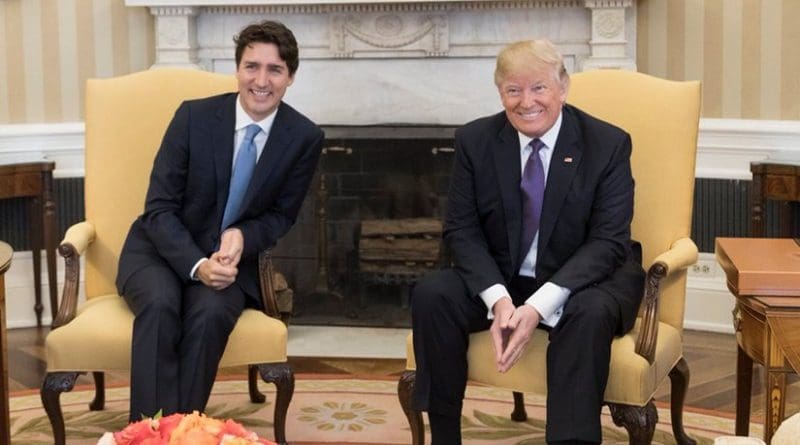The Demise Of NAFTA: Canada’s Silver Lining – OpEd
By Bruce Mabley
These days much of Canadian media and politics has been absorbed in an attempt to read the tea leaves in order to understand and predict the next policy direction coming out of US President Donald Trump.
Canadians have learned the difficult truth of our trading future with the new wizard of Oz south of the border. For a while, some felt that Mexico would bear the brunt of Trump’s ire. If we kept our heads down, all would be well. Let him concentrate on the southern wall and the US trade deficit with Mexico. We, like the other republican pretenders to the White House, are having to deal with a serious underestimation of our adversary. That Donald Trump has become a threat to Canadian economic prosperity and the maintenance of good bilateral relations, let no one doubt this.
Canadian media, prodded onward by our fearless political class, has been expounding on the eminent merits of NAFTA to convince public opinion that If NAFTA is gone, so too is our happy life as world exporters. As if we were a poor nation prior to NAFTA. It is true that NAFTA allowed us to sell more oil to the USA but the cost was the automobile sector, a sector that continues its downward spiral at a high cost to the Canadian taxpayers. NAFTA has allowed Canada to discover a new partner and friend in the hemisphere in Mexico.
On the other hand, NAFTA has increased American control of our economy and created phantom towns like Leamington Ontario when the American Heinz company decided to abandon their plant. Despite this, trade has increased overall.
However, to believe that somehow NAFTA saved the Canadian economy from doom is a false and misleading message. Even worse is the fear of Canadian politicians and media of provoking the ire of President Trump and changing the status quo.
The assault on Canadian trade interests is here and it is very real. Our inability to diversify our markets is part of the problem. Things are already bad and getting worse – 20% tax on softwood lumber, attacks on dairy and Bombardier. What’s next – cultural exports? So much for soft diplomacy as a trade policy stratagem.
In this regard, the BC promise to retaliate by blocking US coal into the port of Vancouver makes eminent sense from both a trade and climate change perspective.
According to Trump, Canada has damaged American trading interests as much as any Mexican may have. Prime Ministers Trudeau’s first visit to Washington and the new President, appeared to end well with the reference to a ‘tweaking’ of NAFTA. Since then, the bad news continues. Belated high level telephone chats with Trump are not going to change his essential direction. He does not listen to the last person he speaks to nor does he rationally weigh alternatives like our Prime Minister says he does.
Who he does listen to are the crowds in Harrisburg Pennsylvania last weekend who are not sympathetic to our ‘worldly’ point of view. Its politics at its simplistic best. We are on the chopping block and our economic interests are in peril. This is not a time for selfies or persuasive cocktail chatter with Evanka.
American perceptions about trade with Canada may or may not be true. In any case, whether we win our cases at international tribunals or not does not seem to matter much. American bullying tactics on softwood lumber mean that Canadian taxpayers get stiffed with the bill through government aid to the forest industry to protect jobs.
Meanwhile the Trudeau government feels that dispatching Ministers to glad hand and ‘communicate’ the real story in the US will have an impact. It will not. We are talking about perceptions, not reality. It is not a school debating class. Trump will insist on changes to NAFTA.
If he does not get them, he will tear up NAFTA to cheers from Harrisburg crowds and get what he wants regardless of Canadian whining.
Trump’s trade measures will exploit the fault lines in our political confederation. Take the softwood lumber case. Everyone knows that this trade irritant has been around for years. Yet, each affected province has decided to meet the challenge in a different way. In Quebec, changes were made to offset the US argument that harvesting wood from crown land was an unfair subsidy. Other provinces did nothing. Once the announcement of the US measure was made, the Quebec government immediately said it would compensate producers. From Ottawa, no such guarantees were forthcoming. Quebec had a plan, Ottawa did not.
On the positive side, Trump may have achieved in awakening Canadians from a long economic slumber. We will now be forced to look for other markets. Innovation may finally become a Canadian watchword for economic prosperity after years of politicians and business leaders paying lip service to it. Our NAFTA induced big sleep is now a thing of the past. There are many who choose fear of the United States and attempt to disguise their misreading of Trump by adolescent prattle about his lack of policy and clarity.
Canada was a rich country before NAFTA and will be a rich country after NAFTA. Trump may have done us a big favor. We have new friends and economic partners since NAFTA and we should drive home the advantages that Trump provides us – free trade with Europe and South Korea, Mexico and our own immense capacity for innovation.

